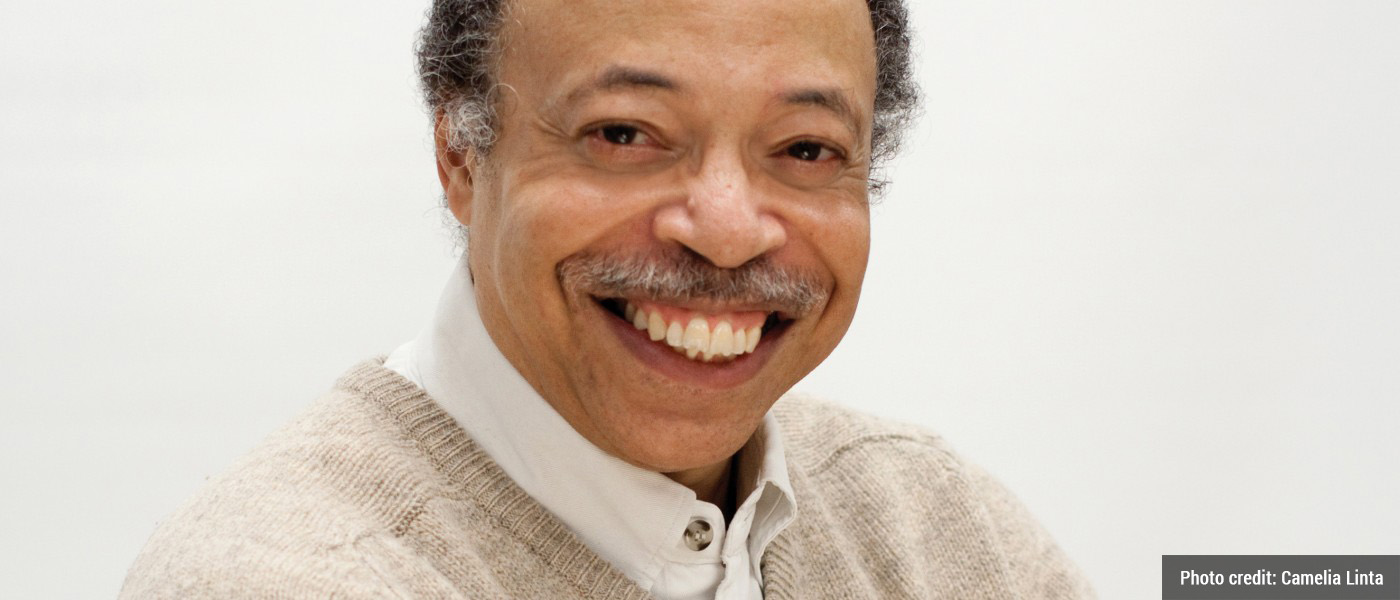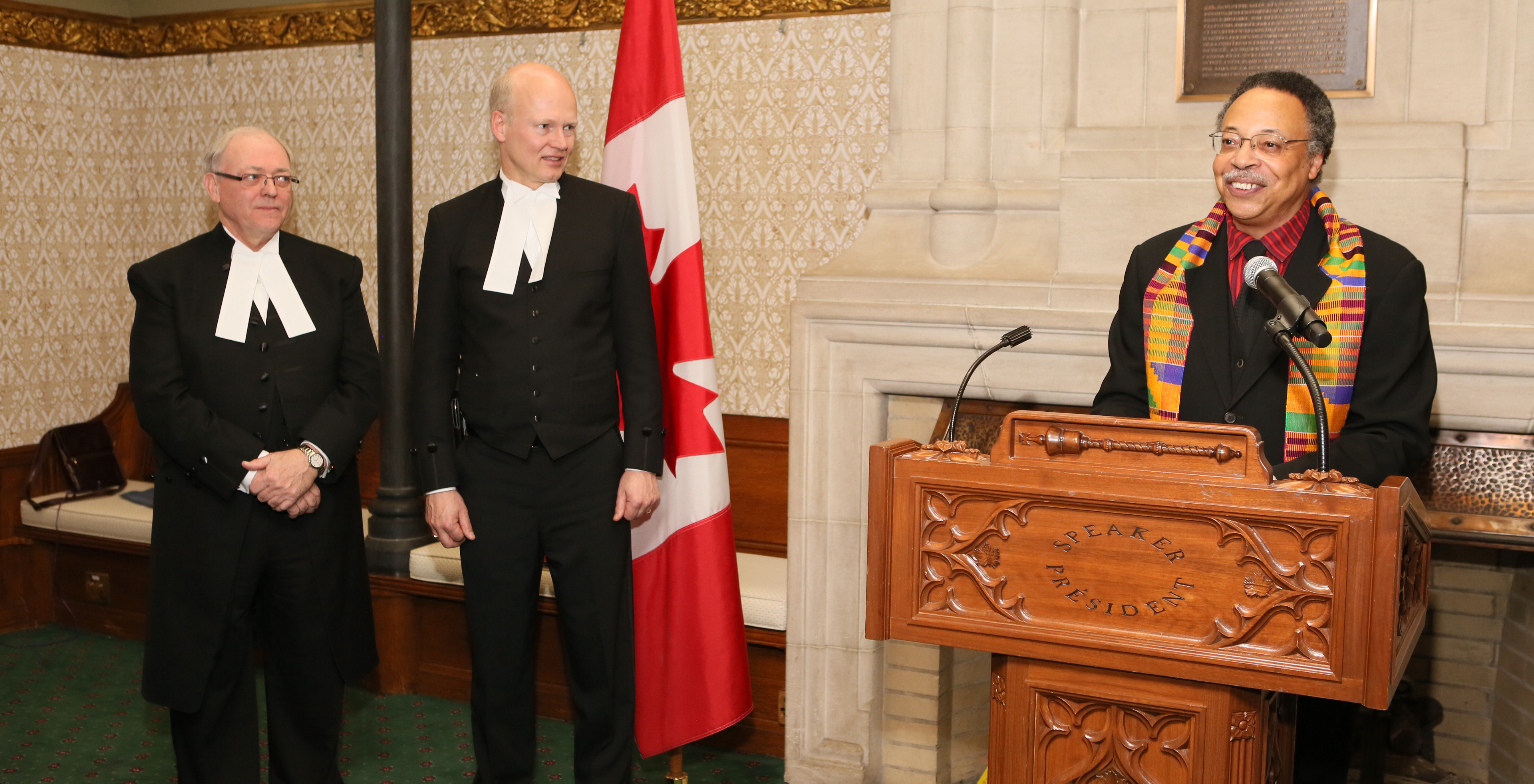Meet Poet Laureate: George Elliott Clarke

Congratulations Prof. Clarke on your appointment as Parliamentary Poet Laureate. You have received many accolades and awards in your distinguished career as a poet, playwright and professor. Why take on this new role and what do you hope to achieve?
I hope to inspire all parliamentarians to sugar and spice their public speech with a bit of verse—to improve the ability of their constituents and of all citizens to aspire to public works and democratic deeds that are undergirded, appropriately, by dreams. All laws begin in dreams; even constitutions are founded, in the end, on visions that are conjured in verse.
I also hope that I can inform all Canadians about the value of poetry in adding to everyday discourse. We all tend to speak and use poetry, anyway, but are not conscious of its appearance—like lightning—in our brains and on our tongues.
My public obligation is to make us more aware of our common access to the empowering oratory and striking thought that is poetry.
As the former City of Toronto's Poet Laureate you worked with the public library to develop the Toronto Poetry Map which gives residents and visitors alike the opportunity to explore the city through poetry. How do you feel poetry can make a difference in the daily lives of Canadians?
Poetry can make a difference in daily life by reminding us that we are all beings with a capacity to invent, craft, artisan, fabricate, make, harvest, and, in the end, simply recognize the graceful apparition and enlightening materialization that is Beauty. We are all—already—artists: To witness poetry—the arresting instant of Beauty—in our everyday speech and homespun lingo—is to be more conscious of our endless capacity for creativity—that which can improve our being, our lives, our homes, neighbourhoods, cultures, and civilizations.
Much of your literary work explores and chronicles the experiences of black Canadian communities in Nova Scotia and New Brunswick, which you refer to as "Africadia." What continues to inspire you about this 'cultural geography'?
“Africadia” is my version of poetic landscapes and vistas—like Longfellow’s Acadia or Shakespeare’s Forest of Arden: It is a place both very real—in its socio-political and economic fact—but also available for myth-making, due to the heroism and resourcefulness of the Africadian people in surviving oppressive circumstances and then triumphing over once-enslavement by inventing their own church, their own form of English, their own salt-spray and snow-dusted African-American and Métis and Caribbean and English and French genealogy and culture….
February is Black History month, a time to celebrate the achievements and contributions of black Canadians. Who are some of your personal heroes, past and present, that you feel more Canadians need to know about?
The list is almost infinitely extendable, but I want to begin by naming a few parliamentarians. Howard D. McCurdy, PhD, who was a Windsor, Ontario, city councillor and, at one point, the head of the now-defunct National Black Coalition of Canada. He was, between 1984 and 1993, the sole African-Canadian in the House of Commons and always an outspoken champion of human rights—in every way.
The Honourable Anne Cools, before and since her appointment to The Senate of Canada, has been a strong champion of civil liberties, independent thought, and commitment to socially conscious principles.
His Honour Lincoln Alexander, before serving as Lieutenant-Governor of Ontario, was the first African-Canadian elected to the House of Commons in 1968 and the first African-Canadian Minister of The Crown.
I also need to mention my relative (!), The Honourable Donald Oliver, Q.C., who spoke frequently, as a Senator from Nova Scotia, about the need for a greater presence of visible minorities in the public service and for recognition of the value of diversity in every Canadian occupation, profession, and industry. Finally, I will mention a great, non-parliamentarian, who sought election to the Nova Scotia Legislative Assembly, but did not prevail in his contest. Nevertheless, Dr. Burnley “Rocky” Jones, ONS, LLD, was an indomitable tribune for social equality.
Name a poem you think all Parliamentarians should take the time to read and why?
I need to cheat a little bit and name, not a poem, but a series of poems, all from a single book: Civil Elegies, by Dennis Lee, is a series of musings, by the Toronto poet, on the history of popular struggles for greater accountability from elected officials and for expanded democratic rights—in Ontario and in Quebec, federally and municipally (Toronto)—from the 1830s to the 1960s.
These poems (published in 1972) represent public thinking, informed by history and the progressive and Canadian-nationalist thought of philosopher George Grant, about collective Canadian aspirations, especially in the 1960s, for an inclusive Canada, an environmentally conscious Canada, a Canada respectful of Indigenous Peoples and heritage, and a Canada independent of other nations’ foreign-policy influences and thus distinctive and beautifully unique.
What words of advice would you give to an aspiring poet?
Read everything and write constantly; experiment with all the styles and forms; above all, recognize your distinct self and original voice, and so never shirk from speaking what you know to be Truth—from your own experience. Pursue Beauty.
George Elliott Clarke, OC, ONS, PhD
Seventh Parliamentary Poet Laureate (2016-17)

Related articles
Tags
Committee news
Meet Poet Laureate: George Elliott Clarke

Congratulations Prof. Clarke on your appointment as Parliamentary Poet Laureate. You have received many accolades and awards in your distinguished career as a poet, playwright and professor. Why take on this new role and what do you hope to achieve?
I hope to inspire all parliamentarians to sugar and spice their public speech with a bit of verse—to improve the ability of their constituents and of all citizens to aspire to public works and democratic deeds that are undergirded, appropriately, by dreams. All laws begin in dreams; even constitutions are founded, in the end, on visions that are conjured in verse.
I also hope that I can inform all Canadians about the value of poetry in adding to everyday discourse. We all tend to speak and use poetry, anyway, but are not conscious of its appearance—like lightning—in our brains and on our tongues.
My public obligation is to make us more aware of our common access to the empowering oratory and striking thought that is poetry.
As the former City of Toronto's Poet Laureate you worked with the public library to develop the Toronto Poetry Map which gives residents and visitors alike the opportunity to explore the city through poetry. How do you feel poetry can make a difference in the daily lives of Canadians?
Poetry can make a difference in daily life by reminding us that we are all beings with a capacity to invent, craft, artisan, fabricate, make, harvest, and, in the end, simply recognize the graceful apparition and enlightening materialization that is Beauty. We are all—already—artists: To witness poetry—the arresting instant of Beauty—in our everyday speech and homespun lingo—is to be more conscious of our endless capacity for creativity—that which can improve our being, our lives, our homes, neighbourhoods, cultures, and civilizations.
Much of your literary work explores and chronicles the experiences of black Canadian communities in Nova Scotia and New Brunswick, which you refer to as "Africadia." What continues to inspire you about this 'cultural geography'?
“Africadia” is my version of poetic landscapes and vistas—like Longfellow’s Acadia or Shakespeare’s Forest of Arden: It is a place both very real—in its socio-political and economic fact—but also available for myth-making, due to the heroism and resourcefulness of the Africadian people in surviving oppressive circumstances and then triumphing over once-enslavement by inventing their own church, their own form of English, their own salt-spray and snow-dusted African-American and Métis and Caribbean and English and French genealogy and culture….
February is Black History month, a time to celebrate the achievements and contributions of black Canadians. Who are some of your personal heroes, past and present, that you feel more Canadians need to know about?
The list is almost infinitely extendable, but I want to begin by naming a few parliamentarians. Howard D. McCurdy, PhD, who was a Windsor, Ontario, city councillor and, at one point, the head of the now-defunct National Black Coalition of Canada. He was, between 1984 and 1993, the sole African-Canadian in the House of Commons and always an outspoken champion of human rights—in every way.
The Honourable Anne Cools, before and since her appointment to The Senate of Canada, has been a strong champion of civil liberties, independent thought, and commitment to socially conscious principles.
His Honour Lincoln Alexander, before serving as Lieutenant-Governor of Ontario, was the first African-Canadian elected to the House of Commons in 1968 and the first African-Canadian Minister of The Crown.
I also need to mention my relative (!), The Honourable Donald Oliver, Q.C., who spoke frequently, as a Senator from Nova Scotia, about the need for a greater presence of visible minorities in the public service and for recognition of the value of diversity in every Canadian occupation, profession, and industry. Finally, I will mention a great, non-parliamentarian, who sought election to the Nova Scotia Legislative Assembly, but did not prevail in his contest. Nevertheless, Dr. Burnley “Rocky” Jones, ONS, LLD, was an indomitable tribune for social equality.
Name a poem you think all Parliamentarians should take the time to read and why?
I need to cheat a little bit and name, not a poem, but a series of poems, all from a single book: Civil Elegies, by Dennis Lee, is a series of musings, by the Toronto poet, on the history of popular struggles for greater accountability from elected officials and for expanded democratic rights—in Ontario and in Quebec, federally and municipally (Toronto)—from the 1830s to the 1960s.
These poems (published in 1972) represent public thinking, informed by history and the progressive and Canadian-nationalist thought of philosopher George Grant, about collective Canadian aspirations, especially in the 1960s, for an inclusive Canada, an environmentally conscious Canada, a Canada respectful of Indigenous Peoples and heritage, and a Canada independent of other nations’ foreign-policy influences and thus distinctive and beautifully unique.
What words of advice would you give to an aspiring poet?
Read everything and write constantly; experiment with all the styles and forms; above all, recognize your distinct self and original voice, and so never shirk from speaking what you know to be Truth—from your own experience. Pursue Beauty.
George Elliott Clarke, OC, ONS, PhD
Seventh Parliamentary Poet Laureate (2016-17)



